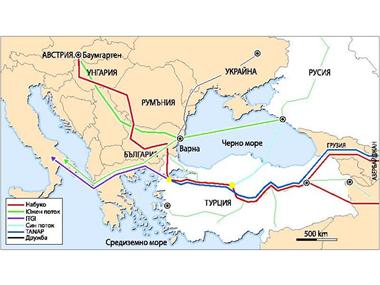Victoria Mindova
The realization of the Trans Adriatic Pipeline (TAP) is of strategic importance for Greece and the country must do everything possible in order for the Mediterraneans to benefit from the gas from Azerbaijan, agreed Greek gas experts at the forum "New territory development" held in Athens. Anthony Livanios, Chief Executive Officer of Energy Stream CMG GmbH stressed that currently, the main rival of the Trans Adriatic Pipeline (TAP) for the transportation of Caspian gas is the Nabucco Pipeline.
 Greece highly values the Adriatic connection because the gas from Azerbaijan will thus pass through its territory and the local market will gain greater independence from Russian gas. The plan is for the Trans Adriatic Pipeline (TAP) to pass through northern Greece, Albania and to end in the city of Brindisi, southern Italy.
Greece highly values the Adriatic connection because the gas from Azerbaijan will thus pass through its territory and the local market will gain greater independence from Russian gas. The plan is for the Trans Adriatic Pipeline (TAP) to pass through northern Greece, Albania and to end in the city of Brindisi, southern Italy.
If the Shah Deniz consortium, which is in charge of the field, were to prefer the West Nabucco project, the gas pipeline would pass from Turkey through Bulgaria, Romania to Austria and our Mediterranean neighbours would remain outside the project supplying Europe with gas from the Caspian Sea.
The next 12 months are crucial for the road of Caspian gas. Greece must act quickly to make the Trans Adriatic Pipeline more attractive than the Nabucco Pipeline, the businessman was adamant. Azerbaijan has signed a bilateral cooperation agreement with Turkey for the construction of the TANAP Pipeline. This is the first step securing the construction of the section between the producing country and the first consumer country. Greece now has to hurry up and sign an intergovernmental cooperation agreement with the governments of Albania and Italy to allow the Trans Adriatic Pipeline to carry more weight than the Nabucco Pipeline. "This should be the first task of the new Greek government," the gas expert said.
In addition to Livanios’ arguments, former Deputy Minister of Energy and Environment Yiannis Maniatis said the Trans Adriatic Pipeline project is more inexpensive than the Nabucco Pipeline is. Moreover, the oil company British Petroleum has become a major shareholder in the Shah Deniz consortium that will operate in the strategic field in Azerbaijan. "Greece has several strategic priorities. The first one is to have a strong presence in the southern path of the gas. The second one is that it wants, and will continue to have, strategic cooperation with Italy. The third is that British Petroleum’s choice to actively participate in the Trans Adriatic Pipeline is a particular advantage for us. This gives us a comparative advantage over the countries included in Nabucco." Ultimately, Maniatis stressed that it would be a great loss for the energy policy of Greece if the Nabucco Pipeline, which passes through Bulgaria, were preferred to the Trans Adriatic Pipeline (TAP). The decision is expected to be taken in the middle of 2013. If by then Greece has not taken measures, such as the ratification of a cooperation agreement with Albania concerning the gas pipeline, TAP may lose the fight.
Beyond the subject of Caspian gas, Maniatis drew special attention to the Burgas-Alexandroupolis pipeline. "I would like to emphasize that in the last 10 years, all Greek governments have been unanimous on the issue of strategic investments in energy and in the construction of gas and oil pipelines, which the country needs. The Burgas-Alexandroupolis pipeline is now suspended and the present Bulgarian government bears the exclusive responsibility for that," Maniatis said. He strongly criticized the Bulgarian state, stating that the environmental impacts presented as a major obstacle to the project could not be the cause for stopping the construction of the pipeline.
"The greatest barriers to energy projects of this kind, which pass through European territories, are the issues of environmental impacts. As for Burgas-Alexandroupolis, Greece has carried out all the studies and has provided all permits relating to the environment, thus overcoming one of the most serious obstacles. Just some days before the Bulgarian government refused to continue the activities for the construction of the pipeline for purely political reasons, the Bulgarian Ministry of Environment and Water has adopted the completeness of the implemented environmental studies. This means that we have overcome the greatest obstacle in Bulgarian bureaucracy." Maniatis stressed that the Burgas-Alexandroupolis pipeline is not only a matter to be resolved between Greece, Bulgaria and Russia after the Directorate General "Environment" to the European Union has taken over the coordination of negotiations for the project. In conclusion, he expressed his hope that the activities connected with the construction of the oil pipeline will be resumed.
The forum discussed other serious issues associated with the change of the energy map beyond the diversification of gas imports. Cyprus’ exclusive economic zone is of crucial importance in facilitating the energy projects in the region, Ambassador of Cyprus to Athens Joseph Joseph said. He also stressed that its establishment has been agreed and ratified by the neighbouring countries. He further noted that Israel and Egypt have ratified the plan for the economic zone. A bilateral international agreement is to be signed with Lebanon, which has been delayed because of disagreements with Israel, not due to Cyprus’ fault, Joseph said. Its establishment will be crucial for regulating the areas of natural reserves, Joseph Joseph said.